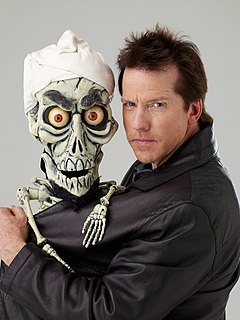Top 1200 Great Management Quotes & Sayings - Page 3
Explore popular Great Management quotes.
Last updated on November 14, 2024.
The management of creativity is more intimate. By that I mean that it deals with an individual's personal, psychological landscape. It deals with the way you create relationships. It deals with creating an atmosphere and environment that support the creative process. As a result, it is a management skill set that is inherently psychological and that encourages desired outcomes rather than demands those outcomes.
It's not a question of arriving and putting in a whole new administration, but instead, arriving and "compacting" things as much as possible, reducing management layers. We want as few management layers as possible, so that executives are very close to the operations. We also don't believe in having big corporate infrastructures.
I am certain that Gadi Lesin's abilities and the experience he accumulated during his sixteen years in a variety of general management roles in Strauss Group in and outside of Israel will enable him, together with group management and all managers and employees of Strauss, to continue to take the group forward to further success.
Nothing in finance is more fatuous and harmful, in our opinion, than the firmly established attitude of common stock investors regarding questions of corporate management. That attitude is summed up in the phrase: "If you don't like the management, sell your stock." ... The public owners seem to have abdicated all claim to control over the paid superintendents of their property.
I was applying to the art school, but there was a checklist that said I had to do either production design or stage management or acting. I thought, "I don't want to be an actor, but I know production and stage management take acting classes" - this is literally my internal monologue. I was like, "Designers don't have to take acting classes. Cool. I'll check that box".
The great irony of management is that the higher up you go, the less actual control you have. When you are but a humble coder, you make the computer do exactly what you want; when you're a manager, you only hope that people understand what you want, and then trust/pray that they do it both correctly and in a timely manner.
What I find in a creative company is while there is a desire to build a management foundation that can feel clear and consistent, the unique product we're in Illumination Entertainment making doesn't always allow for that. So rather than following management strategy that talks about building your structure and then staffing that structure, I tend to build the structure around the strengths of the individual people we have.
I don't think I am very easy to work for because everything has to be just right or we don't put it out. But at the same time, all the people that work for me have a "no asshole" rule, if you're a jerk you're fired, so it's a great team and a lot of skillful people at the top of the game, anybody from management to the agents to the publicists to the day-to-day website stuff and it's just a great team.
Companies, as they grow to become multi-billion-dollar entities, somehow lose their vision. They insert lots of layers of middle management between the people running the company and the people doing the work. They no longer have an inherent feel or a passion about the products. The creative people, who are the ones who care passionately, have to persuade five layers of management to do what they know is the right thing to do.
The TMS is evolving into a logistics platform that can handle all nodes, all geographies and all transportation nodes. It's already talking to other applications in the supply chain, like warehouse management, order management and ERP systems. By adding underlying algorithms, a TMS can now understand the relationship between the cost of inventory and the cost of transportation and come up with an optimal solution to answer those questions.
In investment management today, everybody wants not only to win, but to have a yearly outcome path that never diverges very much from a standard path except on the upside. Well, that is a very artificial, crazy construct. That's the equivalent in investment management to the custom of binding the feet of Chinese women
Not only do you need great lyrics, a great message, a great story, great vocals, great chords... you also need great instrumentation, great editing, great sonics, great mixing, and great mastering. It all comes together to make something truly great, and I think each element combines together to create a powerful impact on the consumer.
I think that the best training a top manager can be engaged in is management by example. I want to make sure there is no discrepancy between what we say and what we do. If you preach accountability and then promote somebody with bad results, it doesn't work. I personally believe the best training is management by example. Don't believe what I say. Believe what I do.
When the study of the household (ecology) and the management of the household (economics) can be merged, and when ethics can be extended to include environmental as well as human values, then we can be optimistic about the future of humankind. Accordingly, bringing together these three ‘E's' is the ultimate holism and the great challenge for our future.
When I wrote my first book, Crisis Management: Planning for the Inevitable, it was endorsed by the American Management Association, and consequently was read by America's top corporate leaders, and overnight put me in high demand as a consultant and as a speaker. Also, that book forever changed the way businesses look at and deal with crises by giving a tangible feel to an otherwise intangible subject.
The ways in which management can express appreciation for an employee's contribution are without end; the key is to act in ways that communicate Thanks! That was a great job! We can really count on you! It's great having you here! While some people love having plaques to hang on their personal Wall of Fame and they adore being acknowledged at a formal Recognition Banquet and some people are only interested in money, I find the most effective forms of recognition are personal and either spontaneous or very close in time to a significant accomplishment.
We have overwhelming evidence that available information plus analysis does not lead to knowledge. The management science team can properly analyse a situation and present recommendations to the manager, but no change occurs. The situation is so familiar to those of us who try to practice management science that I hardly need to describe the cases.
If I come in, and you're an employer, and I say, 'Well, I was a sniper in the Marine Corps. Do you have any sniper positions open?' 'No.' But if I told you that I was good at communication, good at leadership under stressful environments, team management, personnel management, leadership, being prompt, are stuff that I can bring to the table.
JPMorgan was already, for the most part. Our businesses at JPMorgan share the same cash-management systems. The commercial bank, the private bank, the retail bank, they all use the branches. The cash-management system moves the money around the world - for global corporations, and for you, the consumer, too.
I put that in my management's hands and my company's hands. We sit down all together, the family, D-Block, my management and I go build with KOCH, the distributor. You open up your own sites, you get your MySpace, you get your websites and get your little digital team on the side... and that's how you handle that.
I think there are probably too many asset management companies in the world, and I think the place to be is either big or small. The area where it is probably more difficult to be is in the middle ground, where you've got that cost of regulation, you've got the cost of buying your own research, you've got all the costs of running an asset management company without the benefits of a big income producing asset.
I'm excited about silver because as I write, it's relatively inexpensive. I'm also excited about silver because -- unlike real estate, which can require a lot of money, some finance skills, lots of due diligence and property management skills to do well -- silver is affordable to the masses, and management skills are minimum.
Although he reputedly hated the label of 'guru', Peter Drucker was, by any standards, the greatest management guru the world has yet seen. In 1996, the McKinsey Quarterly journal described him as the 'the one guru to whom other gurus kowtow' and Robert Heller described him as 'the greatest man in the history of management', praise indeed for a man who described himself as 'just an old journalist'.
Invest in low-turnover, passively managed index funds... and stay away from profit-driven investment management organizations... The mutual fund industry is a colossal failure... resulting from its systematic exploitation of individual investors... as funds extract enormous sums from investors in exchange for providing a shocking disservice... Excessive management fees take their toll, and manager profits dominate fiduciary responsibility.
Most of the time, your risk management works. With a systemic event such as the recent shocks following the collapse of Lehman Brothers, obviously the risk-management system of any one bank appears, after the fact, to be incomplete. We ended up where banks couldn't liquidate their risk, and the system tended to freeze up.
Workers should have a right to sit across from management to collectively bargain about their work conditions, their wages, and the future direction of the company. To me, that's just a humane thing to do. It is unacceptable in the 21st century to have companies not want to do that with their employees and create a great work environment.
I think stupidity in business is really an interesting thing. What winds up happening is a disconnect between your company's strategic management and then your more applied on-the-street management. I guarantee with you that the board of directors of most companies has no idea what the costs of hiring people really is in the HR department.
I found marketing to be highly descriptive and prescriptive, without much of a foundation in deep research. I brought in economics, organization theory, mathematics, and social psychology in my first edition of Marketing Management in 1967. Today Marketing Management is in its 15th edition and remains the world's leading textbook on marketing in MBA programs. Subsequently, I wrote two more textbooks, Principles of Marketing and Marketing: an Introduction.
Our proposal had more than just money. We would increase their staff and keep their headquarters, their brand and their management in place. We made them a comprehensive offer they couldn't refuse. Shareholders simply receive cash, but with the staff and management, we had to show that we could share the same vision. Employees would probably resent us if money were all [we offered].






















































